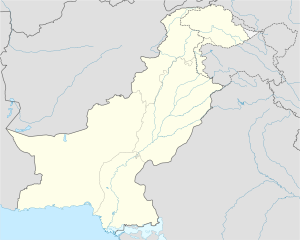Mongol invasion of Sindh
| Battles of Sivistan 1298–1299 | |
|---|---|
| Part of Sivistan, Sindh 26°25′24″N 67°51′47″E / 26.4234157°N 67.8629399°E | |
| Result | Delhi victory |
| Territorial changes | Mongol forces expelled from Sivistan |
In 1298–99, a
Mongol invasion
The
Sometime later, a Mongol force invaded the
The invasion seems to have happened in 1298–99. According to the 17th century chronicle Zafar-al-Walih, the Mongols occupied the Sivistan fort in 697 AH, and the Delhi forces recaptured it in 698 AH.[4]
The 14th century chronicler
The 16th century historian Firishta claims that the invasion was led by Duwa (the ruler of the Chagatai Khanate) and his brother Chaldi (Saldi).[1] However, this is obviously incorrect: Firishta states that after their defeat, Saldi and his brother were imprisoned and brought to Delhi. On the other hand, Duwa was a powerful ruler who remained in power until 1306–07.[5]
Alauddin's response
In 1298–99, a large part of Alauddin's army had
According to the Delhi courtier
Aftermath
Saldi, his brother and other Mongols (both male and female) were arrested and brought to Delhi in chains.[2] No chroniclers state what happened to them, but it is likely that Alauddin ordered them to be killed.[3]
The victory established Zafar Khan's reputation as a brilliant general. According to the chronicler
Alauddin's courtier Amir Khusrau does not mention this conflict in his writings.[1] Alauddin perceived Zafar Khan's actions in the subsequent Battle of Kili (1299) as reckless and a sign of disobedience: therefore, Zafar Khan's name was omitted in the royal chronicles.[2] However, later chroniclers such as Ziauddin Barani, Isami and Firishta have described it.[1]
References
- ^ a b c d e Kishori Saran Lal 1950, p. 153.
- ^ a b c d e Banarsi Prasad Saksena 1992, p. 336.
- ^ a b c Kishori Saran Lal 1950, p. 154.
- ^ a b Peter Jackson 2003, pp. 219–220.
- ^ Kishori Saran Lal 1950, p. 153-154.
- ^ Kishori Saran Lal 1950, p. 89.
- ^ Mohammad Habib 1981, p. 266.
- ^ Kishori Saran Lal 1950, p. 155.
Bibliography
- OCLC 31870180.
- OCLC 685167335.
- OCLC 32230117.
- ISBN 978-0-521-54329-3.
External links
- Description of the campaign by the 14th century chronicler Ziauddin Barani (English translation by Mohammad Habib)

